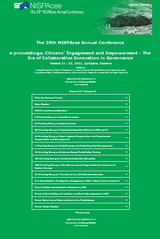5. CONCLUSIONS
A proper summing up of the programme means we must first re-stress its main goals, as formulated by the proposal:
Goal 1: Address key public policy problems in Central and
Goal 2: Build partnerships between higher education and government in Central and
Goal 3: Support the further development of public administration education in Central and
Goal 4: Leverage local capacity provided by NISPAcee by forming
a sustainable partnership and building on past
Goal 5: Engage US universities in a new generation of development partnerships.
The analysis in previous parts of the evaluation, and details provided by annexes fully prove that the programme fulfilled all its goals. Many important public policy problems were included in projects; these included training and its quality, leaderships, auditing, health care delivery, human resources management, policy-making skills, public financial management, advisory capacities and strategic management.
Pre-conditions for awarding the project included letters of endorsement by respective government levels and a willingness to cooperate with academic and training institutions in CEE. In spite of the fact that the same quality of cooperation with government was not achieved, the programme contributed significantly to the building of partnerships and, in some cases, functioning as the starting impulse for joint activities which will continue after the programme is finished. This issue is important for all CEE counties, and in some of them the creation of cooperation represents an important tool with which to cope with the old-fashioned behavior of public officials.
There is no doubt the programme strengthened the institutional capacity of all participating CEE academic and training institutions. New courses and curricula were developed, and books, textbooks, research protocols and training manuals published. Many participants gained additional educational, training, research and cooperative skills.
The position of NISPAcee in the region was strengthened. The project contributed to what had already been achieved in the region via a comprehensive set of its activities, supported by key international players including major
The programme was also an important step forward from the point of view of the engagement of US universities in CEE in a new way, adopting to the changing situation in the CEE region. (Some of recipient countries, for example, are already EU members, and shall be handled accordingly.) A one-way channel was replaced by an open trajectory; it included important flows coming from all connected points: west to east and east to west, but also from east to east.




 Price:
Price: 









